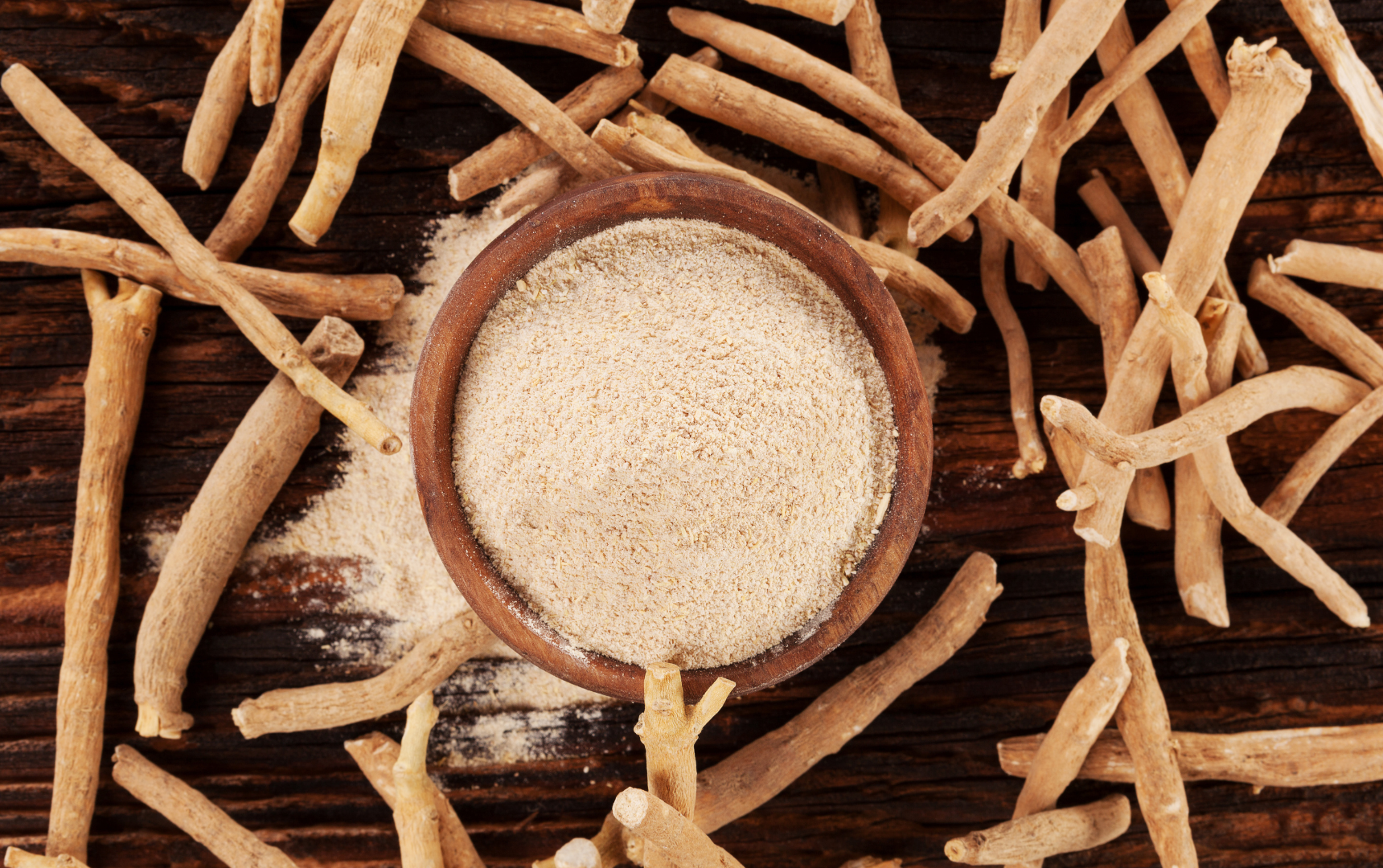
You’ve decided to begin taking an ashwagandha supplement. That’s great! Now you’re wondering how long it’s going to take before you feel super stress-free and energized — and that’s a worthy question. Let’s dive right in and learn what ashwagandha does and when you can expect to notice the benefits of ashwagandha.
Getting Rooted: Digging Into the History of Ashwagandha
Ashwagandha has plenty of street cred. After all, this herbal remedy has been used in Ayurvedic medicine for over 6,000 years. With roots in India, Ayurveda is a holistic style of medicine that uses plant-based foods, herbal medicines, diet, and movement to support total wellness.
Ashwagandha (Withania Somnifera) itself is an evergreen shrub that grows in Asia and Africa. It’s part of the nightshade family and is sometimes referred to as “winter cherry” or “Indian ginseng.”
The colorful, red-orange berries, the leaves and the roots of the ashwagandha plant can be used, and some lower-quality ashwagandha powders are made with the leaves. However, in both clinical trials and millennia of traditional use, the root is the part predominantly used. At JOYÀ, our herbal supplements contain ashwagandha root extract powder.
How Can Ashwagandha Support Well-being?
Ashwagandha is a powerful adaptogenic herb. That means it is able to modulate the immune system and support the body’s stress response, helping bring it back into balance. The bioactive compounds inside of ashwagandha, withanolides, are thought to be responsible for the herb’s medicinal qualities.
Here are a few health benefits you can expect from taking ashwagandha.
Melt Away Stress and Tension
Ashwagandha has been studied extensively as a natural remedy for stress. The results of these studies showed that ashwagandha:
- Improved participants’ thresholds for stress
- Lowered stress assessment scale tests
- Reduced cortisol levels
The bottom line? Ashwagandha makes the central nervous system more resilient to the stress you experience in your life. Plus, effectively managing your stress can majorly boost your overall health in the long run.

Support Sleep Quality
Even though ashwagandha is not a sedative herb and taking it won’t make you feel drowsy, there are several studies that support its ability to help you get a good night of sleep. Chiefly, a compound called triethylene glycol (TEG) is responsible for helping prepare the body for rest. This compound can help enhance sleep quality by inducing sleep naturally.
In one study, supplementation with ashwagandha root extract improved the time it took participants to fall asleep, sleep quality and total sleep time.
Support Athletic Performance
Every gym rat has a supplement they swear by, but the savvy person researches them closely to learn how they work. There’s a reason why you’ll spot ashwagandha powder spilling out of gym bags across the nation.
Ashwagandha increases the amount of oxygen the body can use during cardiovascular exercise, something known as V02 max. The higher a person’s V02 max, the better their athletic performance will be.
Ashwagandha can also increase aerobic capacity (the ability to perform large-muscle, whole-body exercise at moderate to high intensities for extended periods of time), muscle mass and strength. In one randomized clinical trial, participants saw significant improvements in muscle strength after taking 300 mg of ashwagandha twice a day for eight weeks.
In another trial, endurance athletes saw their endurance is enhanced when taking an ashwagandha supplement.

Support Brain Function
For sharper focus, ashwagandha packs some brain-supportive benefits. It’s able to help support healthy cognitive function and mental clarity, and can even help with memory function. In one randomized clinical trial, participants who took ashwagandha had better executive function, significantly improved immediate and general memory, and improved sustained attention span.
Ignite Your Energy
If you’re tired even after drinking cup after cup of coffee, chronic stress might be the culprit.
You can try taking an ashwagandha supplement. Unlike stimulants such as coffee, as a prized adaptogen, it has the potential to support long-term energy levels and fight stress if you’re suffering from mental and physical fatigue related to stress.
Not only is ashwagandha’s use as an adaptogen supported by thousands of years of Ayurvedic medicine—it’s supported by research, too. In one study, participants experienced lower perceived stress and lower cortisol levels with ashwagandha supplementation.
What Is the Timeline for Ashwagandha's Benefits?
How long you need to supplement with ashwagandha in order to feel its effects can take varying amounts of time depending on each individual’s stress levels, biochemistry, and the health benefit it’s being used for.
Some people may experience effects faster than others. Your ashwagandha dosage and your own individual health status will also play a role in how long it takes before you notice effects. Therefore, a guaranteed timeline of supplementation to results is hard to pinpoint.
That said, as an adaptogen, ashwagandha’s effects are felt over time, not instantly. When incorporated into your daily routine, its active compounds have a cumulative effect in your body and become more effective—and noticeable—with sustained use.
Does Ashwagandha Have Any Potential Side-Effects?
On top of being a powerful adaptogen, ashwagandha is without notable side effects. Studies show that it is generally safe for most people when used as recommended.
Possible (yet rare) side effects include drowsiness and lower blood sugar. It’s important, when choosing an ashwagandha supplement, to find a reputable brand that values transparency and uses pure, ethically sourced ingredients. At JOYÀ, we source our ashwagandha from India from ethical farms that grow the highest quality ingredients.
Precautions
Ashwagandha might not be best for pregnant women, breastfeeding individuals, or people with certain autoimmune diseases and/or thyroid issues. It’s best to talk to your healthcare provider if you’d like to start an ashwagandha supplement and fall into one of these groups.
There’s also a potential that ashwagandha will interact with other supplements or medications you currently take. Your pharmacist or a healthcare professional can help you decide if this medicinal herb is right for you. It’s important to take ashwagandha as directed and never exceed the recommended serving size.
How Can You Integrate Ashwagandha Into Your Routine?
Taking ashwagandha at any time of day is suitable. Consider taking it in the morning to help you tap into that brain-building cognitive function and help you reap the benefits of more sustainable energy. If you’re using ashwagandha for better sleep quality, you can consider taking it in the evening.
Taking ashwagandha consistently is one of the best ways to get its stress reduction benefits. In other words, it won’t work well if you only take it once and a while. Taking ashwagandha daily is key.
More Than a Supplement
Sure, you could swallow a large herbal supplement to get your daily dose of ashwagandha — or you could choose JOYÀ’s Balance Functional Chocolate. These powerful superfoods help you enjoy the herbal experience and are loaded with complementary herbs and other adaptogens to help fully support your total wellness.
Check back regularly as we add new ones, and feel free to drop us a line if you come up with one on your own!
Ashwagandha: A ‘Root’ to Wellness You Can Believe In
When you’ve got a lot going on, don’t feel stressed — add ashwagandha to your health stack as a high-quality, natural partner in your wellness journey.
With JOYÀ, supporting your overall well-being has never been easier or more delicious. So what are you waiting for? Check out our Functional Chocolates today and see just how mouthwatering wellness can be.

